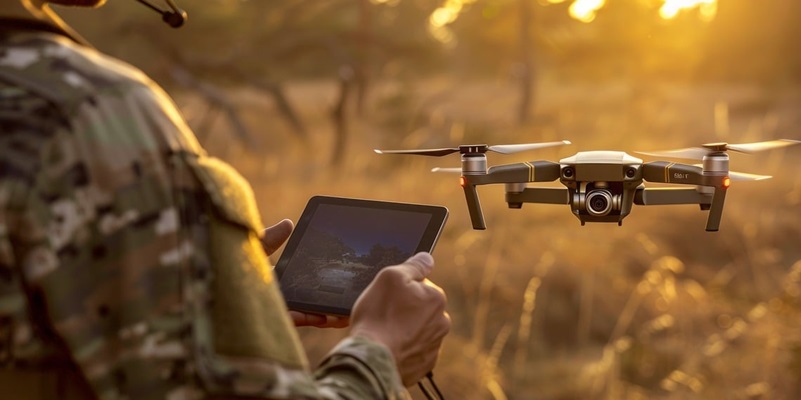As the conflict between Russia and Ukraine continues to escalate, the rapid advancement and deployment of artificial intelligence (AI) systems in Ukraine’s defense technology have become increasingly significant, particularly focusing on unmanned aerial vehicles (UAVs). The strategic integration of AI into UAVs aims to counter the sophisticated electronic warfare tactics employed by Russian forces, thereby enhancing combat capabilities and achieving greater operational efficiency. The role of AI in these developments underscores a broader trend toward AI-driven military technologies, marking a paradigm shift in modern warfare’s operational dynamics. By leveraging AI, Ukrainian defense forces are able to improve precision in targeting, navigation, and operational management, thus setting new standards for combat effectiveness.
AI-Powered Innovations in Ukrainian Defense
In the ongoing Russia-Ukraine conflict, Ukrainian startups have been at the forefront of technological innovation, particularly in the realm of military applications. One notable example is the implementation of AI-powered drones designed to operate autonomously in reconnaissance and attack missions. Key figures such as Sergei Kuprienko from Swarmer have emphasized the critical role of AI, with tools like their proprietary software ‘Styx’ enabling drones to navigate complex environments and execute missions with minimal human intervention. The enhanced targeting and navigation capabilities provided by AI have mitigated the inefficiencies inherent in human-controlled drone fleets, making large-scale wartime operations more feasible and effective.
AI-driven UAVs offer a significant advantage in terms of operational efficiency. Traditional drones, which require constant human oversight, often struggle in electronic warfare scenarios where their communications can be easily disrupted. AI-enabled UAVs, however, are designed to operate independently, significantly reducing the risk of human error and improving mission success rates. This autonomy allows Ukrainian forces to conduct more precise strikes and gather intelligence without the need for continuous real-time input from operators. The effectiveness of these AI systems not only demonstrates their immediate tactical benefits but also underscores their potential to shape future combat strategies.
Ethical and Security Considerations
Despite the obvious advantages of AI-enhanced military technologies, their deployment raises several ethical and security concerns. Experts like Samuel Bendett from the Center for a New American Security have pointed out potential human rights issues related to autonomous weaponry. The capability of AI-controlled drones to execute remote strikes with minimal human intervention can lead to unintended casualties and collateral damage, raising questions about accountability and the ethics of AI in warfare. These concerns necessitate the development of comprehensive regulatory frameworks to ensure that AI applications in military contexts adhere to international laws and ethical standards.
Another critical challenge associated with AI-powered drones is cybersecurity. As AI systems become more integral to military operations, they also become appealing targets for cyber-attacks. Ensuring the security and integrity of AI algorithms is imperative to maintaining the reliability and effectiveness of these systems. Cybersecurity measures must therefore be robust and adaptive, capable of countering sophisticated hacking attempts and securing communication channels integral to the operation of AI-enabled UAVs. Even as Ukraine advances its military technology, constant vigilance and proactive measures are required to protect against cyber threats that could compromise their operational capabilities.
Balancing Technological Advancements with Human Oversight
While the integration of AI in military drone operations promises substantial benefits in terms of precision, efficiency, and situational awareness, human oversight remains a crucial factor to mitigate potential errors and unintended consequences. AI-driven technologies should be seen as tools to enhance human decision-making rather than replacements for it. By maintaining a balance between AI autonomy and human control, Ukrainian defense forces can leverage advanced technologies while minimizing the risks associated with fully autonomous operations.
The strategic use of AI in UAVs represents a significant step forward in modern combat tactics, facilitating more effective and efficient military operations. However, as these systems continue to evolve, it is essential to address the ethical, security, and oversight challenges they present. Comprehensive regulatory frameworks and robust cybersecurity measures are necessary to ensure the responsible and secure deployment of AI in military contexts.
Future Implications and Strategic Considerations
The utilization of AI-enhanced military technologies, while advantageous, raises significant ethical and security concerns. Experts like Samuel Bendett from the Center for a New American Security highlight potential human rights issues tied to autonomous weaponry. AI-controlled drones capable of executing remote strikes with minimal human input can cause unintended casualties and collateral damage, sparking debates on accountability and the ethics of using AI in warfare. These issues underscore the need for robust regulatory frameworks to ensure AI applications in military settings comply with international laws and ethical standards.
A crucial challenge accompanying AI-powered drones is cybersecurity. As AI systems become integral to military operations, they also become prime targets for cyber-attacks. Ensuring the security and integrity of AI algorithms is essential to maintain their reliability and effectiveness. Cybersecurity measures must be robust and adaptive to counter sophisticated hacking attempts, securing the critical communication channels essential for AI-enabled UAVs. As countries like Ukraine enhance their military technology, they must remain vigilant and proactive to protect against cyber threats that could compromise their operational capabilities.

